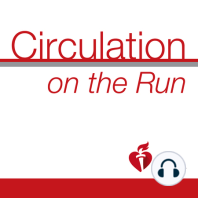18 min listen
Circulation October 9, 2018 Issue
ratings:
Length:
21 minutes
Released:
Oct 8, 2018
Format:
Podcast episode
Description
Dr Carolyn Lam: Welcome to Circulation on the Run, your weekly podcast summary and backstage pass to the journal and its editors. I'm Dr Carolyn Lam, associate editor from the National Heart Center and Duke National University of Singapore. Sacubitril-valsartan reduces the risk of cardiovascular mortality among patients with heart failure with reduced ejection fraction. However, what are its effects on kidney function and cardiac biomarkers in people with moderate-to-severe chronic kidney disease? Well, stay tuned to find out, as we will be discussing the results of the UK Harp III Trial, right after these summaries. The first original paper this week reveals that inhibition of a long non-coding RNA may serve as a novel molecular therapy for aortic aneurysms. First author, Dr Li, corresponding author, Dr Maegdefessel from Technical University Munich, and colleagues, identified the long non-coding RNA H-19 with functional relevance in experimental aortic aneurysm progression in two mirroring models, a novel genetically mutated mini-pig model, as well as end-stage human disease. They found that H-19 mediated expression levels of the transcription factor hypoxia inducible factor 1-Alpha. Which, in the chronic hypoxic environment of an aneurysm, triggers apoptosis in aortic smooth muscle cells. This study, therefore, introduces inhibition of H-19 as a novel molecular therapy to limit smooth muscle cell death in progressing aortic aneurysms. The next study provides insights into molecular mechanisms underlying heart failure progression in chronic pressure overload. Co-first author, Dr Chiang and Alsina, co-corresponding authors, Dr Heck, from Utrecht University, and Dr Wehrens, from Baylor College of Medicine, and their colleagues developed a novel and unbiased way to comprehensively study protein phosphatase 1 or PP1 interactors in a mouse model of progressive heart failure induced by elevated afterload. This so-called PP1 interaction enabled simultaneous interrogation of multiple pathways relevant to heart failure pathogenesis. They found nine specific PP1 interactors that were strongly associated with heart failure progression. Among these, the PP1 regulatory subunit 7 was shown to play a central role by regulating the PP1 interaction, and by acting as a competitive molecular sponge of PP1. In clinical trials of direct oral anticoagulants for atrial fibrillation, patients with end stage kidney disease on dialysis were excluded. Today's study answers the question, "What are the outcomes with Apixaban in dialysis dependent end stage kidney disease patients with atrial fibrillation?" Co-corresponding authors Dr Siontis and Dr Saran from University of Michigan and their colleagues performed a retrospective cohort study of Medicare beneficiaries included in the United States Renal Data System from 2010-2015. All eligible patients were those with end stage kidney disease and atrial fibrillation undergoing dialysis who had initiated treatment with an oral anticoagulant. In prognostic score-matched analysis, Apixaban was associated with lower rates of major bleeding compared with Warfarin, whereas there was no difference in stroke or systemic embolism. Patients on standard dose of Apixaban of 5 mg had a lower rate of stroke and death compared to those on reduced dose Apixaban of 2.5mg. Thus, Apixaban may be associated with superior safety and comparable effectiveness outcomes as Warfarin in dialysis patients with atrial fibrillation. However, these findings require confirmation in a randomized trial setting. Does Canagliflozin have benefits in people with chronic kidney disease, including those with an Estimated Glomerular Filtration
Released:
Oct 8, 2018
Format:
Podcast episode
Titles in the series (100)
Circulation March 21, 2017 Issue: Circulation Weekly: Your Weekly Summary & Backstage Pass To The Journal by Circulation on the Run
